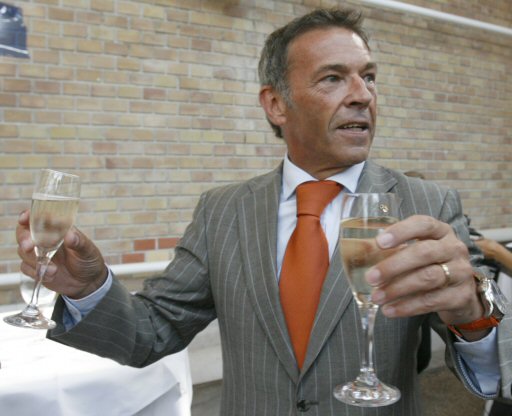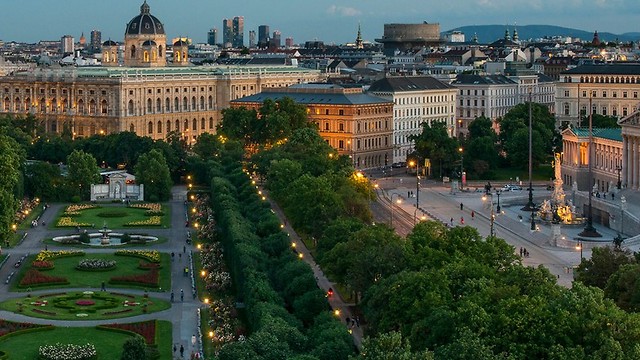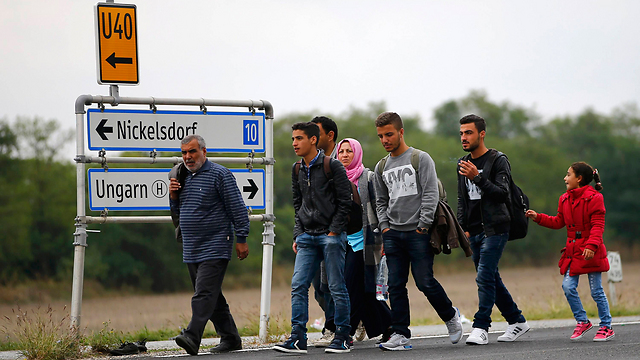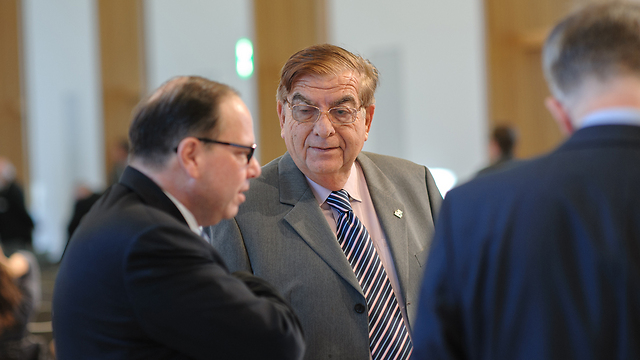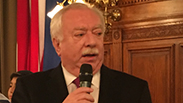
Extremists, refugees, and Austrian Jews caught in the middle
The Austrian-Jewish community is caught between fear of Islamist extremists targeting them and the rise of the far right in the country, with its historic anti-Semitic connections.
Haupl has made sure to mark important Jewish holidays in the past few years. With giant portraits of his predecessors decorating the walls, Haupl watched the lighting of Hanukkah candles, and then gave a short speech dealing mostly with the largest challenge facing him and the residents of Vienna: The absorption of tens of thousands of refugees and migrants, mostly from the Middle East, who keep coming in.
Far right has started supporting Israel
Austria has mainly acted as a way station for immigrants and refugees who are making their way into other European countries, mainly Germany. And still, 100,000 of them have chosen to stay in Austria just this year. Haupl, a democratic socialist who has been Vienna's mayor for the past 21 years, has opened his city's gates to newcomers – and has nearly been ousted for it.The municipal elections which took place last October saw the nationalist right-wing Freedom Party of Austria, which opposes immigration and the dictates of the EU, achieve unprecedented success, becoming the second largest party in the City Council. The widespread public opposition to the incoming wave of Muslim immigrants made it so that only a rally by left-wing voters prevented Freedom Party Chairperson Heinz-Christian Strache from becoming mayor.
The Freedom Party, once led by nationalist and Nazi sympathizer Jorg Haider, has been working in recent years on disconnecting itself from any anti-Semitic ties, and on expressing total support of Israel.
In a recent interview given to Austrian public television, Strache surprised viewers by rejecting all Arab and Muslim claims that oppose Israel's right to exist, clarifying that as long as this attitude goes on there can be no peace in the Middle East. The elders of Vienna's Jewish community can hardly remember when any Austrian politician has ever made such clear statements in Israel's support.
And so, a new reality has been created in Austria: The Jewish Museum Vienna still features references to Strache and his party as representatives of the country's new political anti-Semitism. However, leaders of the Jewish community have somewhat awkwardly admitted to looking closely at the developments inside the Freedom Party.
The main concern: Islamic anti-Semitism
When I ask Oscar Deutsch, head of Austria's Jewish community, what the main concern is for Jews in Austria these days, he answers immediately: "There's Islamic anti-Semitism, which is gaining strength in Austria and all over Europe, The politicians need to fight this phenomenon. Of course we are bothered by the fact that the Freedom Party got 30 percent of the votes in the Vienna elections. However, I believe the urgent topic right now is Islamic anti-Semitism, because it's becoming dangerous."
"We saw in Paris, Brussels, in Copenhagen what it can cause, and we need to fight it," Deutsch continues, "There's harassment of Jews who can be identified as such on the streets. Protests that are held here see swastikas being raised and calls of 'death to Israel,' and 'death to Jews.' The Jewish community has risen up to help the refugees. It's a Jewish tradition. But it's important to know that many of them grew up with anti-Semitism and Jew hatred, which have been indoctrinated to them through the schools and the media. It's hard to believe that eight hours of education they get here in Austria will give them a totally new worldview on the matter."
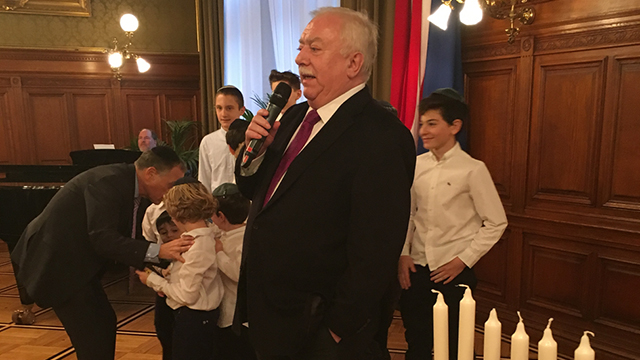
Mayor Michael Haupl doesn't see much cause for concern – not regarding the refugees nor the right-wingers. "We can't forget that 70 percent of voters did not vote for the Freedom Party. Regarding the refugees, they are fleeing starvation and the deathly terror of ISIS in their countries. The terrorists don't need these refugees. The go around Europe fairly easily and purchase weapons here. We need to learn how to protect ourselves from this terrorism, and work to end the wars in the Middle East along with our allies."
Talking about crimes against Jews
The Jewish community's concerns are increasing at a time when, ironically, Austria – and especially Vienna – are finally, 70 years too late, starting to cope with their part in the Holocaust. Carefully so, since most Austrians are still in love with the fairytale they've been telling themselves and the world – that their country was the Nazis' first victim. More and more initiatives are being taken, both public and private, to commemorate crimes committed by Austrians against Austrian Jews.
Unlike the German train operator Deutsche Bahn, which made it difficult for organizers to put up mobile commemoration cars for Holocaust victims, who were transported by German trains to the concentration camps, the Austrian train operator OBB has initiated the establishment of a thorough exhibit showing its historic part in persecuting Jews and other minorities during the time of the Nazi regime.
The exhibit goes from town to town, with thousands of visitors – mainly Austrian high school students. One of the more interesting findings by its curator, Mili Segal, has to do with the level of resistance to the Nazis by Austrian railway workers. "There were so many sabotage acts by railway workers who came from a social-democrat or communist background that company management sent a letter of admonition to the Vienna management, in which it said that the number of sabotage cases is much higher than that in Germany. 150 of the railway workers were executed for deliberate sabotage. Their families had to pay the cost of the execution."
One of the oldest initiatives meant to foster good relations between Austria and the Jews who departed it, before and after the Holocaust, is the Jewish Welcome Service Vienna, established by Holocaust survivor Leon Zelman, who passed away eight years ago. The institute hosts dozens of descendents of Austrian-Jewish families, who spread around the world after the country was annexed by Nazi Germany in 1938. Austria's stubborn refusal to acknowledge its part in the Holocaust and pay fair reparations to victims of the Nazis have caused quite a bit of resentment in communities of former Austrian Jews.
However, in the past few years, there's been a change. "The second generation of Austrian emigrants, mostly in Israel, is starting to take an interest in the family's past," says Suzanna Traunk, an Austrian historian who runs the institute these days. "Whole families are registering for the visit program we organize, which includes a week of visits to historic sites, Jewish community sites, meetings with political leaders. The second generation is more critical towards what was done to their families by the Austrians, during the war and after it. However, there's also a great interest in history. We receive many queries regarding information in the community and city archives. Vienna has tried to deal with the past for the last several years. There's always some ambivalence. The Freedom Party is getting stronger, but there's also a civil society that's very committed to action and commemoration initiatives."
Just 10% of the reparations
One of the guests of the Jewish Welcome Service Vienna was Haim Galon, an Israeli dentist born in Vienna in June 1939, shortly before the start of World War 2. Haim's father was a Zionist activist, which is how the family managed to get out of Vienna and travel to the 21st Zionist Congress in Geneva. From there, they moved on to Israel.
"My father had a cigarette manufacturing plant," Galon says, "Immediately after the Anschluss (the invasion and annexation of Austria by Nazi Germany -ed) a Nazi representative came and confiscated the factory. My father, who died young of a heart attack, didn't want to hear of Austria anymore. When my mother celebrated her 80th birthday, I contacted the Jewish Welcome Service Vienna, asking for them to invite her back to her birthplace. The told me then that there wasn't enough money in the budget. They contacted me back four years later, but my mother was already in a wheelchair and couldn't take such travel. When I reached the age of 70 I contacted the service again, telling them I wanted to visit Austria, before I reach my mother's state. This time there weren't any problems. I was invited and the hospitality was very generous."
Gilon, who is a member of the organization of Austrian emigrants in Israel, has a long-standing grievance with the country. He was among the leaders of the fight against the "Washington agreement" signed in the year 2000 that allowed Austrians to significantly minimize the reparations for Jewish property that was confiscated in the country during the Nazis' time in power. That property has been estimated to have a value of over $15 billion. The sum that Austria's government was willing to pay stood at just about $150 million. Experts on behalf of the Austrian government had to approve the reparation requests and determine the worth of confiscated property. When these processes were concluded, the victims and their families were given about 10 percent of the total value of the suit that was approved by the Austrians. The value of the cigarette factory Galon's father had was estimated to be worth about $100,000. The reparations approved for him were $10,000.
'This country hasn't changed much'
Recently, Haim Galon has started an initiative near and dear to his heart: commemorating all of the Jewish doctors who worked in Austria up to the point it was annexed by the Third Reich. "Seventy percent of all the doctors in Austria were Jewish," he emphasized. "Out of 4,900 doctors, 3,200 were Jews. Three of the four Austrian Nobel laureates in medicine were Jewish. In cooperation with the Austrian doctors association, we're putting together a commemorative book of all the doctors persecuted by the Nazis – Jews, communists, socialists, and homosexuals. In order to complete the commemoration book, we're still searching for relative of Jewish Austrian doctors who were persecuted, expelled, or murdered by the Nazis.
Last November, an academic conference was held in Vienna, dealing with the topic of commemorating Jewish-Austrian doctors.
Even though senior members of the Austrian doctors' association and medical departments in different universities were in attendance, the event reflected the hardships many Austrians have in dealing with their country's criminal past. Again and again speakers recounted the "immigration of Jews to Palestine and the United States," until an American relative of one of the commemorated doctors stopped the discussion and angrily said, "It wasn't immigration, they were thrown out of here."
"In Austria," Haim Gilon estimates, "anti-Semitism is still flourishing. This country hasn't changed much, sadly."











